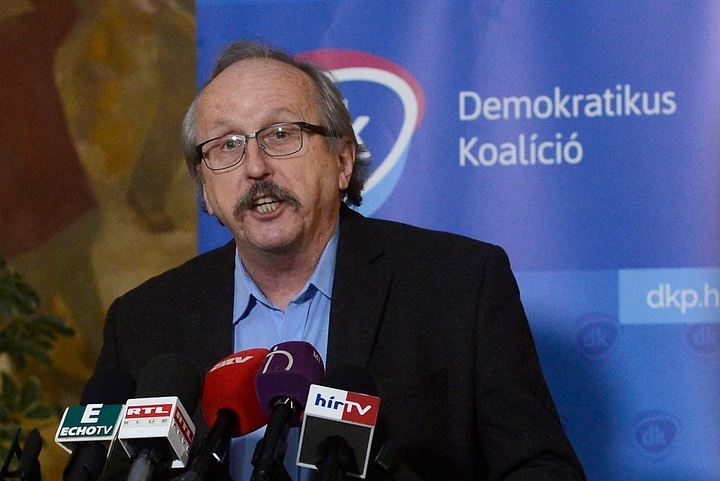Irén Rab's writing was not written yesterday, it was published 2 years ago in Magyar Hírlap. However, it has not lost any of its relevance, because Magyargyólő Péter Niedermüller has not changed at all, or if it has, it has only gotten worse. He was an unscrupulous liberal Bolshevik then, and it is no different today. The only problem is that now he is not leaving behind debts, as at Humboldt University, but insults. Sometimes he labels heterosexual, white, Christian men (and women) as terrifying creatures, and sometimes he considers the Trianon disaster beneficial for the Hungarians pushed outside our borders. And it doesn't even occur to him to mind. So he is a terrifying – no, we don't call him a formation because we don't stoop to his level – figure.
The official letter of the Humboldt University appeared again on the world wide web. The letter was written on May 2, 2006, and was addressed to the Institute of Ethnography of the Hungarian Academy of Sciences. At that time, an official letter looked different, it was paper-based and all the necessary information could be read from its header. The company paper bears the original signatures of the sender, the university's Institute of European Ethnology, and the two professors who wrote the letter, one of whom is the acting director of the institute. The letter was filed according to its order and manner, and a copy was placed in a file cabinet, preserved for eternity. There is no fairy tale, it is real, not fake.
The letter, written fourteen years ago, has become relevant again because its content concerns the affairs of an active party politician, who with his words and actions regularly blows the fuse in Hungarian public life. about Péter Niedermüller , the vice president of the Democratic Coalition and Ferenc Gyurcsány . Niedermüller once worked at the mentioned institute of the Humboldt University in Berlin for about ten years from the mid-1990s. The reason for the uncertainty regarding the time is that the information about Niedermüller on the Internet is very patchy considering his age and public appearance. Perhaps he himself contributed to this as an EP representative. Because the Court of Justice of the European Union ruled in 2014 that certain users can rightfully request the removal of search results containing their name from the world wide web.
This letter, originally in paper format, fell out of the scope of the search engine. When it surfaced in 2017 and was aired by the press, Niedermüller immediately threatened a lawsuit: "You claim to have obtained a letter from eleven years ago? As this allegation raises a number of further troubling questions, I have contacted the relevant authorities this morning and taken the necessary steps.”
What is it about this particular letter that might have troubled our hero?
Niedermüller was last seen at Humboldt University on December 18, 2004. He left without prior notice, in English, at first he sent incomprehensible patient papers, then neither, he was completely absorbed. They were worried about his health at the university, and since they couldn't get in touch with him in any way, they thought he was seriously ill. They partially calmed down when they learned from another source that our scientist was alive and well in Pécs. It was then that they decided to strip him of his professorship, legal status and university membership. (It happened anyway, because Niedermüller's name does not appear anywhere among the institute's seventy-seven former colleagues and researchers.) They wanted to inform the Institute of Ethnography of the Hungarian Academy of Sciences about the exclusion, and also about the fact that Niedermüller "has a significant financial obligation towards Humboldt University and colleagues (debt in Hungarian) left behind". What this means is covered by the official language "píszí". The Germans find it embarrassing to call things by their names.
Sometime around this time, ethnologist colleagues in the university canteen asked me if I knew a Hungarian cultural anthropologist of that name. I was a little surprised that he didn't, because he should be such a famous person. They didn't question me further, but that's natural, a German is fair and not curious. Looking back, it was strange that they even asked. Ever since this story came to my attention, I'm glad I didn't know him. Today, I'm more concerned about the fact that such people are making our name known in the world , and if we're not lucky, they might even fall under the same hat.
I would have liked to know more about Niedermüller when I was writing about him. But his biography cannot be read on the website of his party or the European Parliament, nor is there any information about his academic career and achievements. He wants to be a person without a life history, completely erasing his past. But that doesn't work, because a person's life story is made up of his actions. Niedermüller has his own scientific interpretation of life history, which, according to him, is nothing more than "the reliving of events fixed in memory from the present", the subjectivization of the subjective. "Its function is that the past legitimizes the present and the present legitimizes the past."
Let's not beautify this function back and forth! Tell Niedermüller personally how his Berlin past became etched in his memory! Instead of filing a complaint, do you confirm or deny what is written in the letter, clarify to the public whether the statements are true, and whether you have settled your moral and financial debts with Humboldt University? At least his presence would be legitimized.
Which is what it is.
Source: Magyar Hírlap
Author: Irén Rab
(Header image: MTI)













